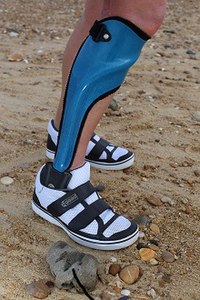
Compound Heterozygous DARS2 Mutations as a Mimic of Hereditary Spastic Paraplegia
Sign Up to like & getrecommendations! Published in 2021 at "Movement Disorders Clinical Practice"
DOI: 10.1002/mdc3.13258
Abstract: Compound heterozygous and sometimes homozygous mutations in the DARS2 gene have been described as a cause of leukoencephalopathy with brainstem and spinal cord involvement and lactate elevation (LBSL; Online Mendelian Inheritance in Man: 611105). LBSL… read more here.
Keywords: hereditary spastic; compound heterozygous; walking distance; spastic paraplegia ... See more keywords

Cognitive dual-tasking augments age-differences in dynamic balance quantified by beam walking distance: A pilot study
Sign Up to like & getrecommendations! Published in 2018 at "Experimental Gerontology"
DOI: 10.1016/j.exger.2018.10.016
Abstract: &NA; There is currently no test to directly and easily measure dynamic balance during walking in old adults. We examined the idea that distance of beam walking with and without cognitive dual‐tasking could detect age… read more here.
Keywords: dual tasking; walking distance; beam walking; beam ... See more keywords

A multicenter randomized controlled study to evaluate whether neuromuscular electrical stimulation improves the absolute walking distance in patients with intermittent claudication compared with best available treatment.
Sign Up to like & getrecommendations! Published in 2019 at "Journal of vascular surgery"
DOI: 10.1016/j.jvs.2018.10.046
Abstract: OBJECTIVE To assess the clinical efficacy of a neuromuscular electrical stimulation (NMES) device to improve the absolute walking distance in patients with intermittent claudication as an adjunct to the local standard care available at the… read more here.
Keywords: intermittent claudication; walking distance; patients intermittent; absolute walking ... See more keywords

Arthrodesis simulation orthosis, an alternative to surgical ankle arthrodesis in ankle osteoarthritis on walking pain by using the methodology of SCED
Sign Up to like & getrecommendations! Published in 2017 at "Annals of Physical and Rehabilitation Medicine"
DOI: 10.1016/j.rehab.2017.07.003
Abstract: Objective Ankle osteoarthritis (AO) is a usual long-term complication of ankle trauma. Pain during walking is the main symptom limiting walking distance. Non-surgical treatment including drugs, corticosteroid intra-articular injection or orthosis, could be used to… read more here.
Keywords: methodology; ankle; walking distance; arthrodesis ... See more keywords

Therapeutic effects of medication use on intermittent claudication: network meta-analysis.
Sign Up to like & getrecommendations! Published in 2020 at "Journal of Cardiovascular Pharmacology"
DOI: 10.1097/fjc.0000000000000956
Abstract: OBJECTIVE To systematically evaluate the therapeutic effects of commonly used drugs for the treatment of intermittent claudication in patients with peripheral arterial diseases. METHODS We systematically searched bibliographic databases for randomized clinical trials published between… read more here.
Keywords: network meta; intermittent claudication; therapeutic effects; walking distance ... See more keywords

Changes in pain scores and walking distance after epidural steroid injection in patients with lumbar central spinal stenosis
Sign Up to like & getrecommendations! Published in 2022 at "Medicine"
DOI: 10.1097/md.0000000000029302
Abstract: Abstract Lumbar spinal stenosis is a common degenerative disorder that is characterized by pain and neurogenic claudication. Previous studies have evaluated the effects of an epidural steroid injection (ESI) on spinal stenosis, based on changes… read more here.
Keywords: spinal stenosis; pain scores; group; walking distance ... See more keywords

Conditional Generative Adversarial Network-Based Regression Approach for Walking Distance Estimation Using Waist-Mounted Inertial Sensors
Sign Up to like & getrecommendations! Published in 2022 at "IEEE Transactions on Instrumentation and Measurement"
DOI: 10.1109/tim.2022.3177730
Abstract: This article introduces a novel regression approach based on deep learning for estimating the walking distance using inertial sensors attached to the pedestrian’s waist. Walking step length can be estimated by using supervised learning. However,… read more here.
Keywords: regression approach; step; regression; step length ... See more keywords

Implementation of a supervised exercise therapy programme
Sign Up to like & getrecommendations! Published in 2019 at "Annals of the Royal College of Surgeons of England"
DOI: 10.1308/rcsann.2018.0171
Abstract: INTRODUCTION Guidelines for peripheral vascular disease state that supervised exercise therapy (SET) programmes improve walking distance and quality of life in patients with intermittent claudication. This paper outlines the steps needed to implement a successful… read more here.
Keywords: exercise therapy; supervised exercise; walking distance; exercise ... See more keywords

Predictors of changes in 6-min walking distance following pulmonary rehabilitation in COPD patients: a retrospective cohort analysis.
Sign Up to like & getrecommendations! Published in 2021 at "European journal of physical and rehabilitation medicine"
DOI: 10.23736/s1973-9087.21.07059-3
Abstract: BACKGROUND Pulmonary rehabilitation (PR) is fundamental in chronic obstructive pulmonary disease (COPD) management but not all patients may show functional benefits from PR. AIM The aim of this study was to identify predictors of non-response… read more here.
Keywords: min walking; pulmonary rehabilitation; rehabilitation; copd patients ... See more keywords

Effect of virtual reality training on walking distance and physical fitness in individuals with Parkinson's disease.
Sign Up to like & getrecommendations! Published in 2018 at "NeuroRehabilitation"
DOI: 10.3233/nre-172355
Abstract: OBJECTIVE To evaluate the effects of gait training with virtual reality (VR) on walking distance and physical fitness in individuals with Parkinson's Disease (PD). METHODS Thirty-seven individuals with PD participated in this prospective, randomized, controlled… read more here.
Keywords: gait training; walking distance; group; training ... See more keywords

Use of the Walking Impairment Questionnaire and Walking Estimated-Limitation Calculated by History questionnaire to detect maximal walking distance equal to or lower than 250 m in patients with lower extremity arterial disease
Sign Up to like & getrecommendations! Published in 2023 at "Frontiers in Cardiovascular Medicine"
DOI: 10.3389/fcvm.2023.968213
Abstract: Objective The objective was to assess the accuracy and optimal threshold of the Walking Impairment Questionnaire (WIQ) and the Walking Estimated-Limitation Calculated by History (WELCH) questionnaire in identifying patients with a maximal walking distance (MWD)… read more here.
Keywords: history; walking impairment; score; walking distance ... See more keywords